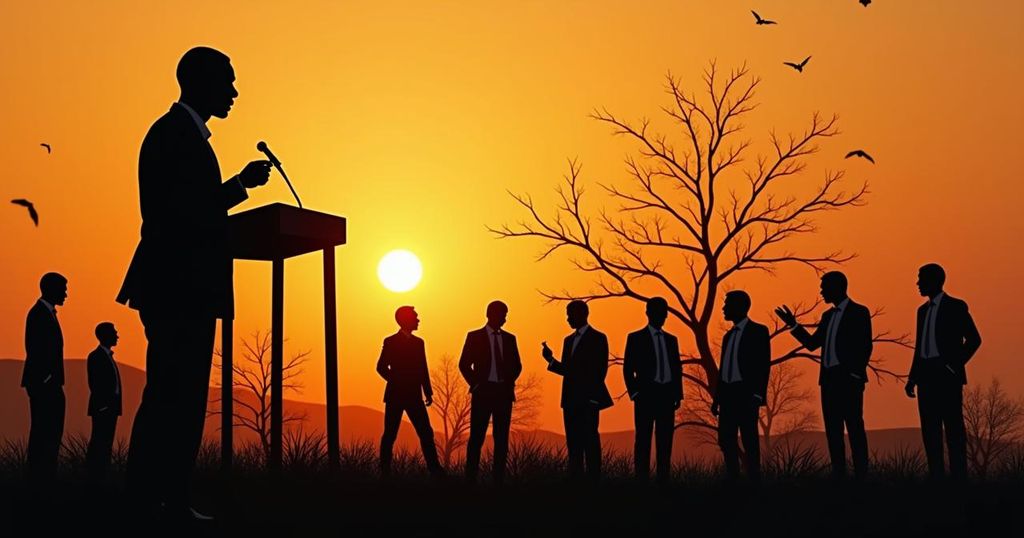Mozambique Election: Frelimo’s Daniel Chapo Faces Strong Challenge from Venâncio Mondlane

Mozambique’s upcoming election is critical, as Frelimo’s candidate Daniel Chapo faces stiff competition from newcomers, including Venâncio Mondlane. The election occurs against a backdrop of public discontent towards Frelimo’s long rule, allegations of voter fraud, and pressing economic challenges. Chapo’s fresh approach contrasts with President Nyusi’s legacy, while Mondlane resonates particularly with young voters dissatisfied with the status quo. Both candidates are actively campaigning to rally support, making the election’s outcome unpredictable.
As Mozambique approaches a pivotal election, the long-standing rule of the Frelimo party faces significant challenges from emerging political figures. In a historic shift, Daniel Chapo, a 47-year-old candidate born after independence, represents Frelimo as it seeks to retain power amid growing disillusionment with its 49-year governance. Political commentator Charles Mangwiro observes the declining support for Frelimo during this election cycle, noting instances of public disapproval during their campaign events. Chapo enters the race following the resignation of President Filipe Nyusi, who has faced scrutiny over corruption scandals and economic hardships stemming from the tuna bond affair. In stark contrast to Nyusi’s administration, Chapo presents a refreshing perspective, distancing himself from Frelimo’s historical corruption and attracting large crowds to his rallies. Encouraging public sentiment, his campaign promotes the notion of integrity and hope for a better future. However, human rights advocate Mirna Chitsungo underscores the skepticism surrounding Chapo’s ability to enact real change, given his affiliation with a party historically associated with corruption. Complicating the electoral landscape, Chapo must navigate accusations of voter fraud, with an estimated 900,000 fake names on the voter rolls, as reported by the Centro de Integridade Pública. Electoral analysts indicate that certain provinces show inflated voter registrations, which may favor Frelimo’s chances upon voting. Chapo’s competition features Venâncio Mondlane, who has emerged as a new contender following his departure from Renamo. Mondlane’s campaign resonates particularly well among the youth, as he emphasizes national pride and empowerment against poverty and unemployment. His strong messaging is amplified by his previous electoral successes, as he garnered significant public support despite alleged electoral fraud in favor of Frelimo in the last local elections. Ossufo Momade, leader of Renamo, also runs for office with a history of negotiating a peace deal to end decades of conflict but faces challenges due to Mondlane’s appeal among traditional Renamo supporters. Momade, despite previously claiming electoral dishonesty, remains committed to the peace process and has solid backing. Both Chapo and Mondlane maintain active campaigns beyond Mozambique, engaging with expatriates in South Africa to broaden their supporter bases. With public unyielding in the face of pressing economic crises exacerbated by jihadist violence in the north, the next president’s primary task will be to instigate job creation and economic development amidst enduring poverty. In summary, the forthcoming elections represent an opportunity for significant change in Mozambique, but uncertainty permeates the atmosphere as candidates make their final appeals before the vote.
Mozambique is at a crossroads with its upcoming elections, marking the end of an era dominated by leaders from the independence generation. The Frelimo party, historically powerful since the country’s liberation from Portuguese rule, faces intense scrutiny as it introduces a candidate born post-independence, Daniel Chapo. This election is marked by heightened public dissatisfaction with Frelimo’s longstanding governance, and allegations of electoral fraud present further complications. Amid economic hardships and an ongoing insurgency, the electorate’s priorities have shifted, emphasizing the need for effective governance and accountability.
The impending elections in Mozambique herald the possibility of transformative change, with new figures like Daniel Chapo and Venâncio Mondlane challenging the Frelimo party’s dominance. The election’s integrity remains under question due to claims of voter fraud, and the public’s demand for economic recovery and anti-corruption measures is louder than ever. As candidates wrap up their campaigns, the outcome remains uncertain, with analysts indicating that the race could yield unexpected results based on voter turnout and sentiment.
Original Source: www.bbc.com







